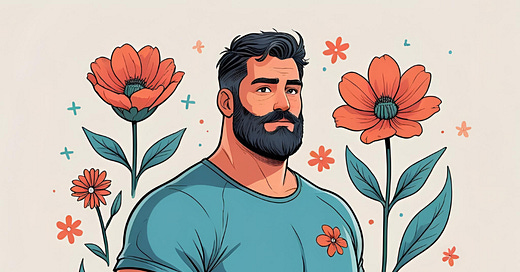Dear Men,
Therapy can be helpful.
And writing about therapy? It’s not easy—especially in a country where talking about mental health still feels like walking into a room that wasn’t built for your kind of silence.
Honestly, it’s hard to even write this right now. There’s a flashback I’ve been living with these past two weeks—its grip tightening every time the weather shifts. Maybe it’s the sudden drop in temperature. Maybe it’s my nervous system knowing it needs to be on alert.
But June is Men’s Mental Health Month.
I’ve never been someone who celebrates “days” or “months.” But something about this moment felt… necessary. Relevant enough to sit with my shame and still share my lived experience.
The Beginning: Books Were My First Therapists
I started reading psychology at fifteen. Not out of curiosity—but as survival. Books became a portal. A way to understand what I couldn’t name. A way to escape.
The first time I sought therapy was in Gurgaon, pre-COVID. There were no online sessions. I’d drag myself through traffic, heart pounding, to meet the T in person. Every visit felt like a battle.
Then came the panic attack that cracked my life open. I moved back to Gwalior in 2019 and stopped therapy—not because it stopped working, but because I didn’t know how to stay when it got hard. Online therapy wasn’t the norm, and my abandonment wounds didn’t help either.
Oh—and did I mention?
Before I found my first therapist, I’d reached out to five others. One, who later featured in a Netflix crime documentary (yes, really), told me to “be positive” because I’d already come far in life. That was her clinical feedback.
Losing Faith (And Slowly Rebuilding It)
After returning to Gwalior, I gave up on therapy for a while. The faith had shattered.
Then COVID happened.
The world paused.
Mental health became a real conversation. And at Amrutam, we started producing a podcast around Ayurveda and mental health—Rediscovering Ayurveda for Self.
While reviewing one of the episodes, something cracked open again. I can’t recall exactly what it was—but I remember reaching out to a new therapist.
That was five years ago.
And we’re still working together.
Healing Isn’t Linear
Sometimes, I still wonder—what’s the end goal of all this “work”? Especially on the bad days, when I spiral into my trauma responses and forget who I am.
Even as I type “trauma response,” I hear the echo of old male voices mocking me:
“Trauma? What trauma? You think you're the only one who’s had it hard?”
As if healing means you think you're better than the wound.
As if friendship means laughing through the pain instead of looking it in the eye.
What Therapy Has Given Me
No, it hasn’t solved everything.
But it has given me:
Fewer impulsive decisions — the ones that used to wreck days or entire months.
Observation of my mind — especially those catastrophic thoughts, the kind that whisper “something bad is going to happen.”
Agency — to keep becoming the person I choose to be, even when life demands I play another role.
I’m Not Saying Go to Therapy
But I am saying:
Start by acknowledging what you’re feeling.
Sit with your truth.
Talk to someone who listens.
Share.
Because sharing saves lives.
I’ve seen it happen.
And if you’re reading this, thank you—for holding space for my story.
With all my heart,
Yash
🖤 If this piece resonated, I’d love for you to share it with someone who needs it.
If you’re struggling right now, know this: you’re not alone. And if you ever need someone to walk beside you—not to fix it, just to be there—I’m right here.



